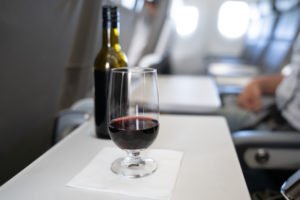Being drunk on a plane is not a crime in and of itself. However, passengers who engage in unruly behavior onboard face up to 20 years in federal prison, criminal fines, and civil penalties of up to $35,000.
In this article, our Las Vegas criminal defense attorneys discuss:
1. Is intoxication on a plane illegal?
Passengers break no law merely by being drunk on a plane. Though passengers do violate federal law by either:
- assaulting or intimidating a flight crew member or flight attendant of the aircraft,
- interfering with the performance of the duties of the member or attendant, or
- lessens the ability of the member or attendant to perform those duties, or
- attempts or conspires to do the above.1
In short, you can be prosecuted for interfering with the flight crew’s ability to do its job – whether you are drunk or not.
Example: Penny boarded a flight at Harry Reid International Airport in Las Vegas with service to Reno-Tahoe International Airport. After downing three beers, she stands in the aisle and refuses to let the flight attendant pass.
Here, Penny broke federal law by keeping the flight attendants from being able to do their job. It does not matter that no one got hurt.

Being intoxicated on a plane is not in an of itself illegal.
Note that federal laws apply to conduct aboard aircraft which are under the “special aircraft jurisdiction of the United States.” This includes commercial flights that:
- Are operated by U.S. carriers;
- Have last departed from the United State; or
- Are landing in the United States on their next stop.4
An aircraft is considered to be in-flight from the moment all external doors are closed following boarding until:
- An external door is opened by a crew member to allow passengers to leave the aircraft; or
- In the case of a forced landing, competent authorities have assumed responsibility for the aircraft and the individuals and property on board.
This means that even when the aircraft is parked at the terminal or sitting on the tarmac, your plane is considered “in flight” if the doors are closed.2
All federal criminal cases are heard in either of the following two courthouses in Nevada:
2. What are the penalties?
Interfering with crew members in violation of 49 U.S.C. 46504 carries:
- up to 20 years in Federal Prison, and/or
- criminal fines
Though the judge can impose up to a life sentence if you used a dangerous weapon to assault or intimate a crew member.3
In addition, the judge can impose civil penalties of up to $35,000 for:
- physically or sexually assaulting a crew member;
- threatening to physically or sexually assault a crew member; or
- taking any action that poses an imminent threat to the safety of the aircraft or other individuals on the aircraft.4
The imposition of civil fines is part of the Zero Tolerance Policy that the Federal Aviation Administration instituted in 2021.5
3. What are the defenses?
The best defenses to federal charges always depend on the specific facts of the case. In our experience representing clients in federal court, prosecutors may be willing to reduce or dismiss charges if we can show:
- You acted in lawful self-defense;
- The incident was an accident, and you did not act purposely;
- You were falsely accused, such as by an angry passenger; or
- The flight crew made a mistake and mistook you for the actual culprit (“mistaken identity”).
These days airline passengers start recording on their phones whenever there is a hint of an airplane skirmish. So we are often able to compile multiple videos from various that show you did nothing illegal.

Interfering with a crew member on a plane is a criminal offense and carries civil penalties.
Legal References
- 49 U.S.C. 46504. Interference with flight crew members and attendants. An individual on an aircraft in the special aircraft jurisdiction of the United States who, by assaulting or intimidating a flight crew member or flight attendant of the aircraft, interferes with the performance of the duties of the member or attendant or lessens the ability of the member or attendant to perform those duties, or attempts or conspires to do such an act, shall be fined under title 18, imprisoned for not more than 20 years, or both. However, if a dangerous weapon is used in assaulting or intimidating the member or attendant, the individual shall be imprisoned for any term of years or for life.
See also: 14 CFR 91.11; 14 CFR 121.580; 14 CFR 125.328; 14 CFR 135.120. See also 14 CFR 91.17 (prohibiting crew members from being intoxicated and prohibiting pilots from letting an intoxicated person onboard). See, for example, United States v. Cope, (10th Cir., 2012) 676 F.3d 1219; Hughes v. AG of Fla., (11th Cir., 2004) 377 F.3d 1258. - 49 U.S.C. 46501.
- See note 1.
- 49 U.S.C. 46318.
- Federal Aviation Administration Adopts Stricter Unruly Passenger Policy, FAA (January 13, 2021). FAA Order 2150.3C.

